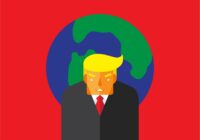The US has never excelled at understanding other cultures, but under Trump the insurmountable obstacles to connecting with cultures that look and feel different have become more apparent.
Did we need proof that racism is implicit in US foreign policy? The proof has been there for centuries through a myriad of historical facts, including slavery, systematic neglect of minorities and the specific US brand of neoliberal neocolonialism. If no one seems to notice it, that’s because for the past two centuries, officials, politicians and the media alike have — with occasional exceptions — learned to control their language without fundamentally changing their inherited attitudes to racial differences.
In an attempt at historically objective analysis, a member of the Trump administration —Kiron Skinner, director of policy planning at the State Department — felt it necessary to point out, concerning the US rivalry with China, that this is “the first time that we will have a great power competitor that is not Caucasian.”
Here is today’s 3D definition:
Caucasian:
Not necessarily coming from the Caucasus (in western Asia), but representing through the light color of one’s skin the values of civilization that darker-skinned people will fail to understand and be expected to resist
Contextual note
Skinner herself is African-American and can hardly be suspected of racism. She honestly describes what she sees as a situation that is “a bit perplexing for the American foreign policy establishment” — i.e., her bosses, the white ruling class. She knows what drives them and what their limits are.
An article in The Diplomat logically surmises from Skinner’s “broader remarks … that the U.S. State Department taking pains to prepare for a ‘clash of civilizations’ with China.” In most people’s minds, the idea of a “clash of civilizations” implies the eventual victory of one or the other, and those who evoke it generally work to make sure that their side will win.
Interestingly, one Chinese commentator notices that Skinner is right, but her remarks tell us nothing about China and everything about the United States itself. Chi Wang, president of the US-China Policy Foundation, makes this important point: “A State Department official criticized for highlighting these factors in calling China an unprecedented threat to the US has, in fact, put her finger on the root of the problem — America doesn’t understand China, and its policy is the poorer for it.” More simply stated, the US foreign policy establishment is not only incapable of understanding other cultures, but fails to appreciate its own racism.
Skinner asserts that the coming conflict is “a fight with a really different civilization and a different ideology, and the United States hasn’t had that before.” In other words, she highlights three factors of differentiation: civilization (language, culture), ideology (presumably communism, though certainly not in the Cold War sense of communism vs capitalism) and race. She even seems to imply that race is the factor that makes the gap unbreachable, since cultures are known to adapt over time and ideology can rapidly shift.
Historical note
One of the effects of the Cold War on anyone in the US who takes the time to think about foreign policy has been the persistent assumption that there will always be — or even that there always should be — a “great power competitor” of the United States.
This also assumes that the conflict with that competitor will determine not only a wide range of foreign policy decisions, but also the orientation of the economy itself, which has become massively dependent on (if not enslaved to) the military-industrial complex. That Dwight D. Eisenhower is the only president or high level official to have admitted and even warned about this dependence (which he did only as he was leaving office) tells us how thoroughly dominant it is, since it has become verboten in all official circles to mention its existence, let alone to consider it a problem.
The unexpected collapse of the Soviet Union, between 1989 and 1991, threw most foreign policy experts into a state of confusion. President George H.W. Bush declared there would be a “new world order,” presumably without a “great power competitor” this time around. But the very idea was unsettling. It should have led to the dismantling of NATO and the downsizing of the military-industrial sector. Instead, it prompted Samuel Huntington to identify a new enemy with his 1993 article in Foreign Policy on the “clash of civilizations.”
 Drawing on the facile intuition of Rudyard Kipling — “East is east, and west is west and never the twain shall meet” — Huntington offered the entire Middle East (minus Caucasian and non-Muslim Israel) as the protean enemy to replace the former “great power competitor.” That gave the world the incredible mess that followed 9/11: unmanageable, perennial wars across the entire region, failed states and unprecedented polarization along lines of cultural identity. It ultimately impelled Barack Obama to lose interest in the Middle East, change course and “pivot” to Southeast Asia, which effectively positioned China as the new threat.
Drawing on the facile intuition of Rudyard Kipling — “East is east, and west is west and never the twain shall meet” — Huntington offered the entire Middle East (minus Caucasian and non-Muslim Israel) as the protean enemy to replace the former “great power competitor.” That gave the world the incredible mess that followed 9/11: unmanageable, perennial wars across the entire region, failed states and unprecedented polarization along lines of cultural identity. It ultimately impelled Barack Obama to lose interest in the Middle East, change course and “pivot” to Southeast Asia, which effectively positioned China as the new threat.
Huntington focused on religion or at least religious identity as the differentiating factor. The effect of that cultural shift in political thinking turned out to be catastrophic and not just in terms of destruction. The tradition of tolerance of multiple religions that existed in most nations of the Middle East — Iraq and Iran being prime examples — withered and died as the Muslim nations and their governments began to see Westerners, Christians and Jews as impenitent aggressors and even their own Christians and Jews, settled for generations among them, as members of the hostile camp.
As Steven Ward pointed out in The Washington Post, Skinner’s focus on “Caucasian” ignores history because Japan was once a great power rival with a different culture and a non-Caucasian population. Indeed, the Japanese case underlines what has been constant in US policy: racism. President Franklin D. Roosevelt ordered the internment of Japanese Americans during World War II, something no one would have envisaged for German Americans or Italian Americans.
In 2008, Obama’s election proved that US racism was no longer absolute, that some non-Caucasians could be respected and honored. But Obama very consciously played to the hilt the role of the president of a nation that sees itself as fundamentally Caucasian, much as Shakespeare’s Othello over-identified with the values of the Venetian State and applied what he took to be its elevated sense of justice to his wife and then to himself.
*[In the age of Oscar Wilde and Mark Twain, another American wit, the journalist Ambrose Bierce, produced a series of satirical definitions of commonly used terms, throwing light on their hidden meanings in real discourse. Bierce eventually collected and published them as a book, The Devil’s Dictionary, in 1911. We have shamelessly appropriated his title in the interest of continuing his wholesome pedagogical effort to enlighten generations of readers of the news.]
The views expressed in this article are the author’s own and do not necessarily reflect Fair Observer’s editorial policy.
Support Fair Observer
We rely on your support for our independence, diversity and quality.
For more than 10 years, Fair Observer has been free, fair and independent. No billionaire owns us, no advertisers control us. We are a reader-supported nonprofit. Unlike many other publications, we keep our content free for readers regardless of where they live or whether they can afford to pay. We have no paywalls and no ads.
In the post-truth era of fake news, echo chambers and filter bubbles, we publish a plurality of perspectives from around the world. Anyone can publish with us, but everyone goes through a rigorous editorial process. So, you get fact-checked, well-reasoned content instead of noise.
We publish 2,500+ voices from 90+ countries. We also conduct education and training programs
on subjects ranging from digital media and journalism to writing and critical thinking. This
doesn’t come cheap. Servers, editors, trainers and web developers cost
money.
Please consider supporting us on a regular basis as a recurring donor or a
sustaining member.
Will you support FO’s journalism?
We rely on your support for our independence, diversity and quality.






